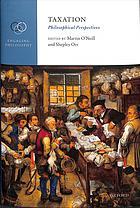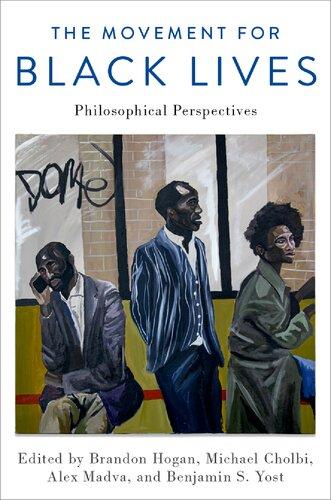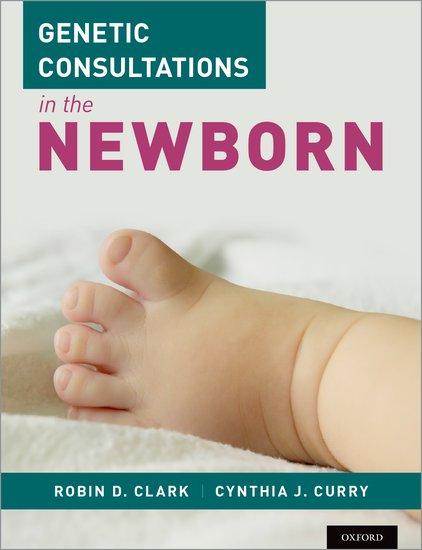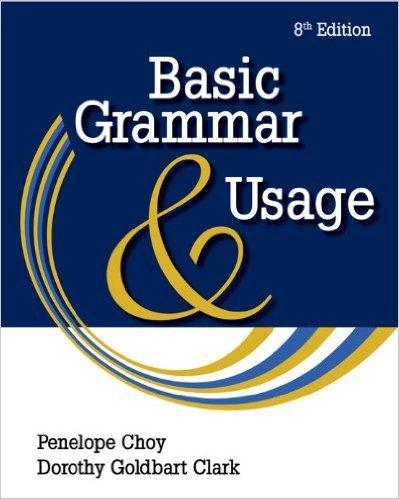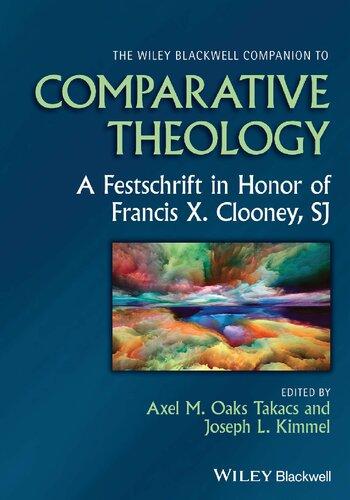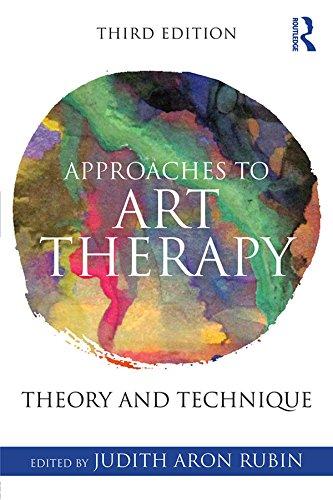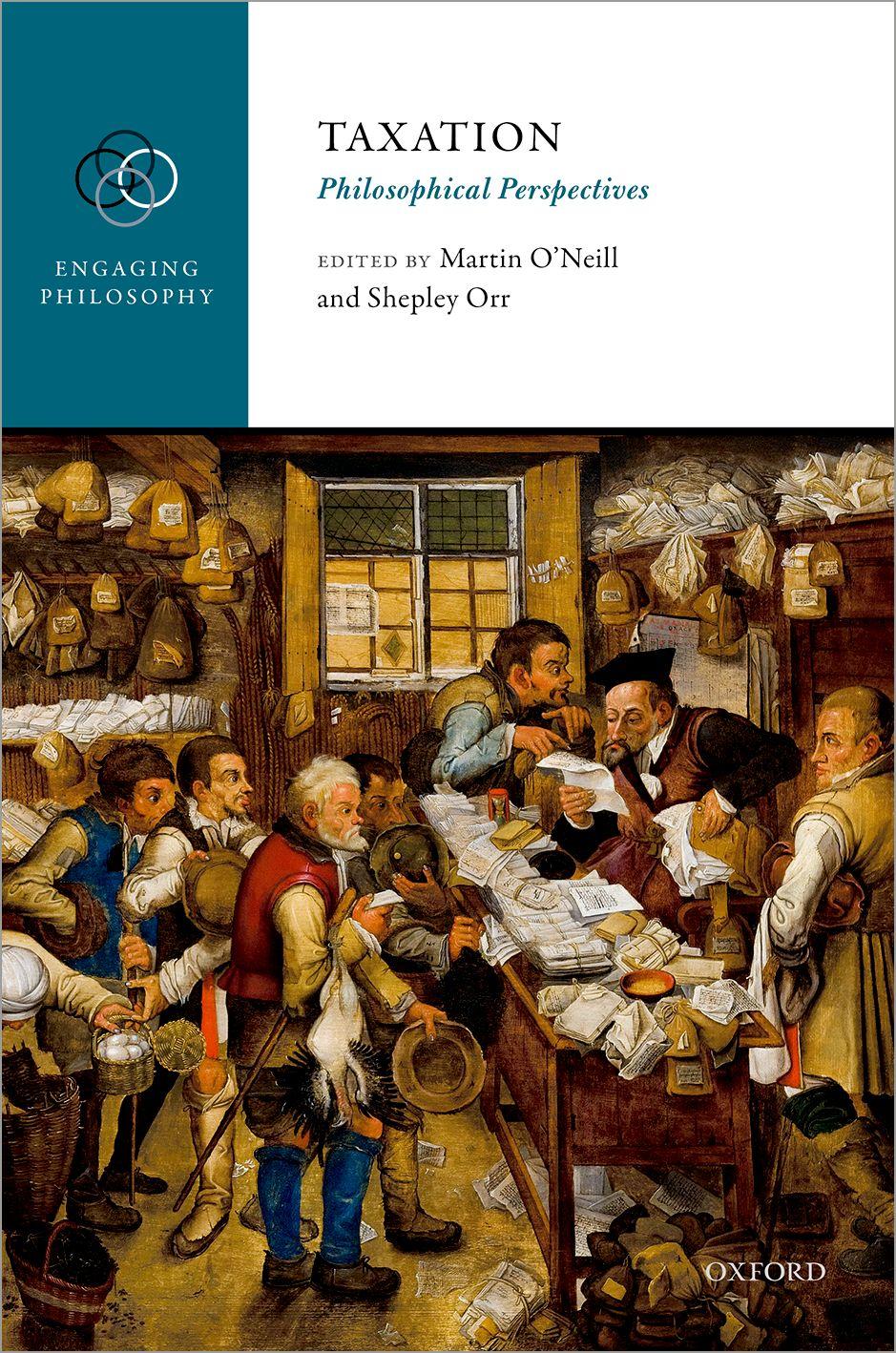https://ebookmass.com/product/taxation-philosophicalperspectives-martin-oneill/
Instant digital products (PDF, ePub, MOBI) ready for you
Download now and discover formats that fit your needs...
Ibsen's Hedda Gabler: philosophical perspectives Gjesdal
https://ebookmass.com/product/ibsens-hedda-gabler-philosophicalperspectives-gjesdal/
ebookmass.com
The Movement for Black Lives: Philosophical Perspectives Brandon Hogan
https://ebookmass.com/product/the-movement-for-black-livesphilosophical-perspectives-brandon-hogan/
ebookmass.com
Bad Words: Philosophical Perspectives On Slurs David Sosa
https://ebookmass.com/product/bad-words-philosophical-perspectives-onslurs-david-sosa/
ebookmass.com
Genetic Consultations in the Newborn Robin D. Clark
https://ebookmass.com/product/genetic-consultations-in-the-newbornrobin-d-clark/
ebookmass.com
https://ebookmass.com/product/etextbook-978-1428211551-basic-grammarand-usage/
ebookmass.com
Mirror for Humanity: A Concise Introduction to Cultural Anthropology (B&b Anthropology) 10th Edition, (Ebook PDF)
https://ebookmass.com/product/mirror-for-humanity-a-conciseintroduction-to-cultural-anthropology-bb-anthropology-10th-editionebook-pdf/ ebookmass.com
Ringtone 1st Edition Yves Doz
https://ebookmass.com/product/ringtone-1st-edition-yves-doz/
ebookmass.com
NSFW: A Novel Isabel Kaplan
https://ebookmass.com/product/nsfw-a-novel-isabel-kaplan/
ebookmass.com
The Wiley Blackwell Companion to Comparative Theology: A Festschrift in Honor of Francis X. Clooney, SJ 1st Edition
Axel M. Oaks Takacs
https://ebookmass.com/product/the-wiley-blackwell-companion-tocomparative-theology-a-festschrift-in-honor-of-francis-x-clooneysj-1st-edition-axel-m-oaks-takacs/
ebookmass.com
Approaches to Art Therapy: Theory and Technique 3rd Edition, (Ebook PDF)
https://ebookmass.com/product/approaches-to-art-therapy-theory-andtechnique-3rd-edition-ebook-pdf/
ebookmass.com
Taxation ENGAGINGPHILOSOPHY Thisseriesisanewforumforcollectivephilosophicalengagementwith controversialissuesincontemporarysociety.
DisabilityinPractice
EditedbyAdamCuretonandThomasE.Hill,Jr.
Taxation
PhilosophicalPerspectives
EditedbyMartinO’NeillandShepleyOrr
BadWords
PhilosophicalPerspectivesonSlurs
EditedbyDavidSosa
Taxation PhilosophicalPerspectives EDITEDBY MartinO’Neill andShepleyOrr
GreatClarendonStreet,Oxford,OX26DP, UnitedKingdom
OxfordUniversityPressisadepartmentoftheUniversityofOxford. ItfurtherstheUniversity’sobjectiveofexcellenceinresearch,scholarship, andeducationbypublishingworldwide.Oxfordisaregisteredtrademarkof OxfordUniversityPressintheUKandincertainothercountries ©theseveralcontributors2018
Themoralrightsoftheauthorshavebeenasserted
FirstEditionpublishedin2018
Impression:1
Allrightsreserved.Nopartofthispublicationmaybereproduced,storedin aretrievalsystem,ortransmitted,inanyformorbyanymeans,withoutthe priorpermissioninwritingofOxfordUniversityPress,orasexpresslypermitted bylaw,bylicenceorundertermsagreedwiththeappropriatereprographics rightsorganization.Enquiriesconcerningreproductionoutsidethescopeofthe aboveshouldbesenttotheRightsDepartment,OxfordUniversityPress,atthe addressabove
Youmustnotcirculatethisworkinanyotherform andyoumustimposethissameconditiononanyacquirer
PublishedintheUnitedStatesofAmericabyOxfordUniversityPress 198MadisonAvenue,NewYork,NY10016,UnitedStatesofAmerica
BritishLibraryCataloguinginPublicationData
Dataavailable
LibraryofCongressControlNumber:2017963203
ISBN978–0–19–960922–2
Printedandboundby CPIGroup(UK)Ltd,Croydon,CR04YY
LinkstothirdpartywebsitesareprovidedbyOxfordingoodfaithand forinformationonly.Oxforddisclaimsanyresponsibilityforthematerials containedinanythirdpartywebsitereferencedinthiswork.
AdvancedPraise “Theoriesofdistributivejusticehaveenormousimplicationsfortaxsystems.Yetthe topicoftaxationitselfhasrarelybeengivensystematicattentionbyphilosophers. Thistimelyandimportantvolumeisthe firsteditedcollectiononphilosophical approachestotaxationandsetsaveryhighstandard.Itcontainscontributionsfrom leadinginterdisciplinarypoliticalphilosophers,whoprovidearangeofrigorously arguedperspectivesbothongeneralquestionsofthejustificationoftaxation,andon thedesirabilityofspeci fictaxes.Showingthatitisfarfromanabstractormerely technicalissue,thisessentialvolumemakesapowerfulcasethattaxationisacentral concernfordistributivejustice.”
JonathanWolff,BlavatnikProfessorofPublicPolicy, UniversityofOxford
“Taxesaremorethanarithmetic;theyinevitablyraisequestionsofvalues.Yet,with fewexceptions,philosophershavelefttaxestoeconomistsandpoliticians.This excellentvolumebringstogetherarangeofvalues,viewpointsandconsiderations thatbearontaxesingeneralandonspecificcases.Itshouldbewidelyreadby philosophersaswellasbyanyoneinterestedinunderstandingwhat’satstakeinour debatesabouttaxes.”
DebraSatz,MartaSuttonWeeksProfessorofEthicsin SocietyandProfessorofPhilosophy,StanfordUniversity
“Myths,slogans,ideology fewtopicsarelessunderstoodthantax,andyetfewareas ofpolicyaremoreimportantforrealizingjustice.Inthisbookexpertsfromseveral disciplinesinterrogatetaxation,fromitsphilosophicalfoundationstohowweshould changeourlawstoday.Richinideas,thiscollectionwillbeessentialforeveryonewho wantstounderstandwhattaxationreallyisandhowitcanbedoneright.”
LeifWenar,ChairofPhilosophyandLaw, King’sCollegeLondon
MartinO’NeillandShepleyOrr
PartI.OntheTaxSystem:Normative andConceptualQuestions
1.WhatPoliticalPhilosophyShouldLearnfromEconomics aboutTaxation17 AlanHamlin
2.Welfarism,Libertarianism,andFairnessintheEconomicApproach toTaxation37 MarcFleurbaey
3.StrivingfortheMiddleGround:Taxation,Justice,andtheStatus ofPrivateRights60 GeoffreyBrennan
4.TaxingorTaking?PropertyRhetoricandtheJusticeofTaxation81 LauraBiron
5.LibertarianismandTaxation98 PeterVallentyne
6.TaxPolicyandFairInequality111 AlexanderW.CappelenandBertilTungodden
7.BeggarYourNeighbour(OrWhyYou Do WanttoPayYourTaxes)124 VéroniqueMunoz-DardéandM.G.F.Martin
PartII.TaxPolicyandFormsofTaxation: PhilosophicalIssues
8.TheCaseforaProgressiveBenefitsTax147 BarbaraH.Fried
9.MoralObjectionstoInheritanceTax167 StuartWhite
10.ThePoliticsofLandValueTaxation185 IainMcLean
11.TheStateandTaxCompetition:ANormativePerspective203 PeterDietsch
12.GlobalTaxationandAccountingArrangements:SomeNormatively DesirableandFeasiblePolicyRecommendations224 GillianBrockandRachelMcMaster IndexofNames
ListofFigures,Table,andBox Figures
3.1Democraticequilibriumandmaximinintaxratedetermination75
6.1Unfairnessandinequalityovertime120
Table 11.1Relationbetweenthechallengepresentedbytaxcompetition andthenormativeresponse218
Box
2.1Socialobjectivesandtheirincometaximplications49
NotesonContributors L AURA B IRON studiedPhilosophyatQueens’ College,Cambridge,andatHarvardon aKennedyScholarship.ShecompletedaPhDinPhilosophyatStJohn’sCollege, Cambridge,beforetakingupaJuniorResearchFellowshipatQueens’ College.She hasworkedasaGreenwallFellowinBioethicsandHealthPolicyatJohnsHopkins University,anassistantProfessorofPhilosophyattheUniversityofVirginia,anda LecturerinPhilosophyattheUniversityofKent.Laurarecentlytrainedforordained ministryintheChurchofEngland,andcurrentlyworksasapriestinOxford Diocese.
G EOFFREY B RENNAN isProfessorEmeritusinthePhilosophyDepartment,Australian NationalUniversityandVisitingResearchProfessoratDukeUniversity(inPolitical Science)andUNC-ChapelHill(inPhilosophy).Aneconomistbytrainingandfor mostofhisacademiclife,henowself-identi fiesasaPPEscholarworkingatthe intersectionofEconomicsandSocial&PoliticalPhilosophy.
G ILLIAN B ROCK isProfessorofPhilosophyattheUniversityofAucklandinNew Zealand.Herpublicationsinclude GlobalJustice:ACosmopolitanAccount (Oxford UniversityPress,2009); DebatingBrainDrain:MayGovernmentsRestrictEmigration? (OxfordUniversityPress,2015,withMichaelBlake); Cosmopolitanismversus Non-Cosmopolitanism (OxfordUniversityPress,2013,edited); ThePoliticalPhilosophyofCosmopolitanism (CambridgeUniversityPress,2005,editedwithHarryBrighouse);and GlobalHealthandGlobalHealthEthics (CambridgeUniversityPress, 2011,editedwithSolomonBenatar).
A LEXANDER W.C APPELEN isProfessorinEconomicsattheDepartmentofEconomics,NHHNorwegianSchoolofEconomics,andanassociatedresearcheratthe CentreforAppliedResearchatNHH.Heco-directstheresearchgroupTheChoice Lab,andistheDeputyDirectoroftheCentreofExcellenceFAIR(Centrefor ExperimentalResearchonFairness,Inequality,andRationality).Hisresearchareas areinbehaviouraleconomics,optimaltaxation,experimentaleconomics,distributive justice,andbusinessethics.
P ETER D IETSCH isafullprofessorintheDepartmentofPhilosophyattheUniversity ofMontreal.Heworksonissuesofeconomicethics,withafocusonthedistribution ofincomeandwealthaswellasontheevaluationofeconomicpolicies.Hispublicationsinclude CatchingCapital:TheEthicsofTaxCompetition (OxfordUniversity Press,2015)and DoCentralBanksServethePeople? (co-authoredwithFrançois ClaveauandClémentFontan,PolityPress,2018).DietschisamemberoftheCollege ofNewScholarsoftheRoyalSocietyofCanada.
M ARC F LEURBAEY isRobertE.KuenneProfessorinEconomicsandHumanistic Studies,andProfessorofPublicAffairsattheUniversityCenterforHumanValues atPrincetonUniversity.HehasbeenaneconomistatINSEE(Paris),aProfessorof EconomicsattheUniversitiesofCergy-PontoiseandPau(France),andaresearch directorattheNationalCenterforScientificResearch(CNRS)inParis.Hehasalso beenaLachmannFellowandavisitingprofessorattheLondonSchoolofEconomics. Heistheauthorof Fairness,Responsibility,andWelfare (2008),andco-author of BeyondGDP (withDidierBlanchet,2013),and ATheoryofFairnessandSocial Welfare (withFrançoisManiquet,2011).Hehasbeenacoordinatingleadauthorfor theIntergovernmentalPanelonClimateChange(IPCC)andisoneoftheinitiatorsof theInternationalPanelonSocialProgress(IPSP).Hisresearchonnormativeand publiceconomicsandtheoriesofdistributivejusticehasfocusedinparticularonthe analysisofequalityofopportunity,onfairallocation,andsocialchoicetheory,with applicationstoincometaxation,healthpolicy,andclimatemitigation.
B ARBARA H.F RIED istheWilliamW.andGertrudeH.SaundersProfessorofLawat StanfordUniversity.Shehaswrittenextensivelyonquestionsofdistributivejusticein theareasoftaxpolicy,propertytheory,andpoliticaltheory.Sheistheauthorof The ProgressiveAssaultonLaissezFaire:RobertHaleandtheFirstLawandEconomics Movement (HarvardUniversityPress).Acollectionofheressaysonmoraland politicaltheoryisforthcomingfromOxfordUniversityPress.
ALAN HAMLIN isEmeritusProfessorofPoliticalTheoryattheUniversityofManchester andVisitingProfessoratKing’sCollege,London.HewaspreviouslyProfessorof EconomicsandDeanofLaw,Arts,andSocialSciencesattheUniversityofSouthampton.Hehaswrittenwidelyattheintersectionofphilosophy,politics,andeconomics, withrecentworkonexpressivepoliticalbehaviour,constitutionalpoliticaleconomy, non-idealtheory,feasibility,andconservatism.
I AIN M C L EAN isaSeniorResearchFellowofNuffieldCollege,Oxford,anddirectsits GwilymGibbonCentreforpublicpolicy.Hehasbeeninterestedinpropertytaxessince histimeaselectedmemberandcommittee(vice-)chairofTyne&Wearmetropolitan CountyCouncilinthe1970s.OtherinterestsincludelandreforminScotlandandWales, andtheScottish,American,andFrenchEnlightenments.Hehasbeenamemberoflocal taxpolicyworkinggroupsfortheScottishParliamentandtheWelshgovernment.He wasVice-PresidentforPublicPolicyoftheBritishAcademyfrom2012to2016.
R ACHEL M C M ASTER isaNewZealand-qualifiedsolicitorcurrentlypractisingcommerciallitigationinLondon.SheholdsaBachelorofArts(PoliticalStudies/ Economics)andaBachelorofLawsfromtheUniversityofAuckland,andaMaster ofLawsfromHarvardLawSchool.DuringhertimeattheUniversityofAuckland, sheworkedasaresearchassistantunderthesupervisionofProfessorGillianBrock.
Shehasaparticularinterestintheapplicationofglobaljusticeprinciplestopublic policyinthe fieldsoftaxationandhealth.
M IKE M ARTIN istheWildeProfessorofMentalPhilosophyattheUniversityof Oxford,andMillsAdjunctProfessorofPhilosophyattheUniversityofCalifornia, Berkeley.Formanyyears,hetaughtatintheDepartmentofPhilosophyUCL.Much ofhisworkisfocusedinthephilosophyofperception,andhehaskeeninterestinthe workofDavidHume,includinghismoralandpoliticalphilosophy.
V ÉRONIQUE M UNOZ -D ARDÉ isProfessorofPhilosophyatUCLandalsoteachesat theUniversityofCalifornia,Berkeley.Herresearchisprincipallyinpracticalreasoning,ethics,andpoliticalphilosophy,aswellasineighteenth-centurypolitical thought,particularlythatofRousseauandHume.
M ARTIN O ’ N EILL isSeniorLecturerinPoliticalPhilosophyattheUniversityofYork. HewaspreviouslyHallsworthResearchFellowinPoliticalEconomyattheUniversityofManchesterand,beforethat,ResearchFellowinPhilosophyandPoliticsat StJohn’sCollege,Cambridge.Hisworkhasappearedinjournalssuchas Philosophy& PublicAffairs andthe JournalofPoliticalPhilosophy,andheisco-editor(withThad Williamson)of Property-OwningDemocracy:RawlsandBeyond (Wiley-Blackwell, 2012).HeisaCommissioningEditorof Renewal:theJournalofSocialDemocracy. Heisinterestedinsocialjusticeinboththeoryandpractice,includingvariousissues attheintersectionofpoliticalphilosophy,politicaleconomy,andpublicpolicy.
S HEPLEY O RR isLecturerintheDepartmentofCivil,Environmental&Geomatic EngineeringintheUCLFacultyofEngineeringSciences,andanaffiliatememberof theUCLCentreforPhilosophy,Justice,andHealth.Hepreviouslyworkedinthe DepartmentofEconomicsattheUniversityofEastAnglia.Hisworkhasappearedin journalsspanninganumberofdisciplines,including Politics,PhilosophyandEconomics (PPE), Kyklos, TransportationResearch,andthe JournalofRiskandUncertainty.Hefrequentlyconsultsforarangeofpublicandprivatebodiesonissues relatingtodecision-making,benefitvaluation,andpolicyformation.
B ERTIL T UNGODDEN isProfessorinEconomicsattheDepartmentofEconomics, NHHNorwegianSchoolofEconomics,andanassociatedresearcherattheCentre forAppliedResearchatNHH.HeistheScientificDirectoroftheCentreofExcellenceFAIR(CentreforExperimentalResearchonFairness,Inequality,andRationality)andco-directstheresearchgroupTheChoiceLab.Hisresearchareasarein behavioraleconomics,normativeeconomics,politicalphilosophy,anddevelopment economics.Hehaspublishedextensivelyininternationaljournalsineconomics, philosophy,generalsciences,andmanagementscience,andheiscurrentlyonthe editorialboardsofseveralinternationaljournals.
P ETER V ALLENTYNE isFlorenceG.KlineProfessorofPhilosophyattheUniversityof Missouri,USA.Hewritesonissuesoflibertyandequalityinthetheoryofjustice(and left-libertarianisminparticular)and,morerecentlyonenforcementrights(rightsto protectprimaryrights).Heisanassociateeditorofthe JournaloftheAmerican PhilosophicalAssociation andof SocialChoiceandWelfare.
S TUART W HITE isTutorialFellowinPoliticsatJesusCollege,Oxford.Heisthe authorof TheCivicMinimum (2003)and Equality (2006),andco-author,withRajiv PrabhakarandKarenRowlingson,of HowtoDefendInheritanceTax (2008).Heis currentlywritingabookthatisprovisionallyentitled DemocracyOverWealth? LiberalRepublicanPoliticalEconomy.
Introduction MartinO’NeillandShepleyOrr
Thetaxsystemiscentraltotheoperationofstatesandtothewaysinwhichstates interactwithindividualcitizens.Taxesareusedbystatestofundtheprovisionof publicgoodsandpublicservices,toengageindirectorindirectformsofredistribution,andtomouldthebehaviourofindividualcitizensthroughincentivizingcertain activities(suchascharitablegiving,orinvestmentinnewtechnology)throughtax breaks,ortodissuadepeoplefromengaginginotheractivitiesbymeansofPigouvian taxes,including ‘sintaxes’ (suchasthoseassociatedwiththeconsumptionofalcohol ortobacco).¹Giventheabsolutecentralityofthetaxsystemtosomeofthemain functionsofthestate,theanalysisofconceptualandnormativeissuesrelatingto taxationshouldbeattheheartofpoliticalphilosophy.Theshapeofthetaxsystemis anunavoidablyandirreduciblynormativematter,andonewhichimplicatesa numberofcoreconcernsofsocialjustice.²Whenwethinkaboutissuesofsocial justiceinpractice,wecannotavoidthinkingatthesametimeabouttax.
Giventhattaxationisoneofthemostsignificantmechanismsforinteraction betweenstatesandindividualcitizens,itisperhapssurprisingthattherehasnotbeen asmuchworkontaxationwithinpoliticalphilosophyasonemighthaveexpected. Thisisnot,ofcourse,tosaythatpoliticalphilosophyhasbeensilentabouttax.But asthechaptersinthisvolumeshow,thereareanumberofpressingandsignificant philosophicalissuesrelatingtothetaxsystem,andtheseissuesoftenconnectin fascinatingwayswithfoundationalquestionsregardingpropertyrights,democracy, publicjustification,stateneutrality,stability,politicalpsychology,andarangeof otherissues.Manyofthesedeepandfascinatingphilosophicalquestionsabouttax havenotalwaysreceivedasmuchsustainedattentionastheyclearlymerit.Ourhope isthatthisbookwilladvancethedebatealonganumberofthesephilosophicalfronts, andbeawelcomespurtofurtherwork.
¹Forageneralintroductiontotheeconomicsofthetaxsystem,seeStiglitz2000;HindriksandMyles 2006;Barr2012;AtkinsonandStiglitz2015.OnPigouviantaxes,seePigou1932;Baumol1972.
²Forasurveyarticleonjusticeandtaxation,seeHalliday2013.
Thebook’saimofadvancingthedebateabouttaxationinpoliticalphilosophyhas bothgeneralandmorespecificaspects,involvingbothoverarchingissuesregarding thetaxsystemasawhole(discussedprimarilyinPartIofthebook),andmore specificissuesrelatingtoparticularformsoftaxpolicy(whicharethefocusof PartII).Thinkingclearlyabouttaxisnotaneasytask,asmuchthatisofcentral importanceismissedifoneproceedsattoogreatalevelofabstraction,andissuesof conceptualandnormativeimportanceoftenonlycomesharplyintofocuswhen viewedagainstreal-worldquestionsofimplementationandfeasibility.Seriousphilosophicalworkonthetaxsystemrequiresaninterdisciplinaryapproach,andthis volumeincludescontributionsfromanumberofscholarswhoseexpertisespans neighbouringdisciplines,includingpoliticalscience,economics,publicpolicy,and law.Wearefortunateindeed,aseditors,tobeabletopresentsucharangeofchapters fromscholarswithsuchanimpressiverangeofscholarlyexpertise.
Beforebrieflyintroducingeachchapter,wewillbegin firstbysketchingsomething ofthephilosophicalbackgroundagainstwhichthecontributionsmadebythese chapterscanbeviewed.
Oneusefulsetofstartingpointsforphilosophicaldiscussionsoftaxationarethe polarcontrastsprovidedbyRobertNozickandJohnRawls,whosediametrically opposedviewsofthejusticeandlegitimacyofthetaxsystemhaddeeprootsintheir similarlycontrastingviewsonthenatureofpropertyrights.Writingin Anarchy, State,andUtopia,Nozickfamously(orperhapsinfamously)declaredthat “Taxation ofearningsfromlaborisonaparwithforcedlabor” (Nozick1974:169),arguingthat mandatory fiscalcontributionsshouldextendonlytothesupportoftheminimal stateneededfortheprotectionandenforcementofpropertyrights,andthatredistributivetransferstobenefittheneedyordisadvantagedshouldbeachievedinstead byphilanthropicbeneficenceratherthanbycompulsoryenforcement.Suchviews flowedfromNozick’sunderlyingviewthatpropertyrights,includingrightsofselfownership,werefundamentallypre-political,creatingconstraintsonwhatastate couldlegitimatelydotointerferewiththepre-existingpropertyrightsoftheindividualsonitsterritory.
Thisstarkandausterelibertarianpictureofthestatusoftaxationcontinuesto exertastronginfluenceovercontemporarydebates,bothpositivelyandnegatively,as bothinspirationandasafoilforopposingviews.Thisengagementwithlibertarian ideasisaccordinglyverymuchpresentinthisvolume.Amongthebook’schapterswe have,fromPeterVallentyneinChapter5,adetailedexaminationofhowwemight thinkabouttaxgivenalibertarianunderstandingofpre-politicalpropertyrights. Contrastingly,fromVéroniqueMunoz-DardéandMikeMartininChapter7,we haveanargumentprosecuteddirectlyagainstNozick’sviewsregardingthesuperiorityofcharitablegivingovercompelledtransfersviataxation;andinChapter8we haveafurthercriticalengagementwiththelibertariantraditionofthinkingabout taxation,asBarbaraFriedpresentsapowerfulcritiqueoftheidea,sometimesadvanced fromthepoliticalright,thatifwethinkoftheidealtaxsystemasinsomewaysa
market-mimickingmechanismdesignedtochargepeopleforbenefitsreceived,we wouldtherebybeabletobuildaprincipledcaseagainstprogressivetaxation.
ProvidingalmostthestarkestimaginablecontrasttotheNozick’slibertarian approachtotaxationthereistheviewoftaxassociatedwithJohnRawls(Rawls 1999,2001).ForRawls,propertyrightsarenotpre-politicalconstraintsonthe operationofpoliticalandeconomicinstitutions,butrathertheyarethemselves creationsofthe “basicstructure” ofsociety,thatisof “themainpoliticalandsocial institutionsandthewaytheyhangtogetherasasystemofcooperation” (Rawls2001: 8–9).OnRawls’sviewtherulesofthetaxsystem,likeanyothersetofpublicrules governingthedistributionofmaterialbenefitsandburdenswithinsociety,arealso simplyaspectsofthatbasicstructure.Ataxsystemisjust,onRawls’sview,whenit operatesaspartofanoverallsystemofrulesandinstitutions,includingthefullsetof rulesandinstitutionsgoverningproperty,thattakentogethersatisfytheprinciplesof justice.Theassessmentofjusticeis,onaRawlsianview,sociallyholistic,andthetax systemisjustonepartofthatwhole.Thus,whereasforNozickquestionsofthe justiceorlegitimacyoftaxationarequestionsaboutwhetherorhowthestatecan interferewithcertainpre-politicalpropertyentitlements,forRawlsquestionsoftax justicearejustoneaspectofabroadersetofquestionsaboutsocialjustice.
Rawlshimselfdoesnotgiveasystematicaccountofthetaxsystemthatwould berequiredwithinajustsociety,beingfullyawareofhowdifficultthetaskwouldbe, giventheholismofjustice,andthefactthat,inajustbasicstructure,everything dependsoneverythingelse.Buthedoesmakesome “illustrativeandhighlytentative” remarks(Rawls2001:136)regardingthetaxesthatwouldbeneededinabasic structure.FollowingJamesMeade(1964),Rawlsendorses aspotentiallythemost importantredistributivetoolavailabletogovernment ahighlyprogressive, recipient-orientedformofinheritanceandcapitaltransfertax.³Suchaggressive formsofcapitaltaxationwould,Rawlsthought,benecessaryinordertobreakup theintergenerationaltransfersofrelativeadvantagethatwouldotherwisemakeit impossibletorealizethefairvalueofthepoliticallibertiesorfairequalityof opportunity.Hence,Rawls’ssketchfortheinstitutionsofajustsocietywhich, followingMeade,hedescribedasa “property-owningdemocracy”,hadthissuperchargedversionofinheritance(andcapitaltransfer)taxationasoneofitskey elements(seealsoO’Neill2012;O’NeillandWilliamson2012;O’Neill2015).(In Chapter9,StuartWhitedefendsthekindofinheritancetaxendorsedbyMeadeand Rawlsagainstanumberofpossiblelinesofnormativeobjection.)
ThebroadlyRawlsianapproachtothinkingabouttaxreceivesitsfullestdevelopmentinwhatisperhapsthemostimportanttreatmentoftaxwithinpolitical
³FormoreonRawls’sremarksregardingthetaxsystemthatwouldbeneededinajustsociety,including criticaldiscussionofhis(tentative)endorsementofaproportionalexpendituretax,seeO’Neilland Williamson2015.
philosophyduringthepastfewdecades,LiamMurphyandThomasNagel’sbook, TheMythofOwnership:TaxesandJustice (MurphyandNagel2002).⁴ Murphyand Nagel’sbookloomslargeinthebackgroundtothediscussionspursuedinthepresent volume,anditisthereforeworthwhiletopausetopresentthecentralelementsof theirview.MurphyandNagelbeginfromthecoreRawlsiancommitmentstothe primacyofthebasicstructureandtheholismofjustice.Thelegalrulesofthetax system,onthisview,arejustoneaspectoftherulesofproperty,andthequestionof thejusticeoftherulesofpropertyarejustoneaspectoftheholisticquestionofthe justiceofthebasicstructure.
AsMurphyandNagelingeniouslyshow,thisbasicconceptualpointcarrieswithit anumberofstrikingparticularimplicationsforhowwethinkaboutthenormative assessmentoftaxpolicy.Mostimportantly,onthisbroadlyRawlsianview,theideaof “pre-taxincome” simplyhasnonormativestanding.Itisnotthatwehavesome primitiveentitlementtoourmarketholdings,withwhichthestatetheninterferes; rather,ourpropertyentitlementsaresimplywhatresultsfromtheoperationofthe rulesofpropertytakentogether,ofwhichthetaxrulesaresimplyonepart.Pre-tax incomeisjustaconventionalaccountingidentity,denotingausefulbutimaginary quantityofnonormativesignificance.Whatfollowsfromthisisthatmuchofthe day-to-dayvocabularyusedtotalkaboutthejusticeofthetaxsystem,muchofit groundedinthepublic financetraditionassociatedwiththeworkofRichard Musgraveandothers(Musgrave1959),butwhichhassincethenbecomethe quotidiancommonsenseoftaxpolicydiscussions,isconfusedandincoherent. Oneoftenhearsaboutthefairdistributionof “thetaxburden”,buttheveryideaof thetaxburdeninvolvesmakingacomparisonbetweentheappropriatelyreal figure ofpost-taxincomeandthemerelyphantasmagorical figurethatispeople’spre-tax income.Toeventalkofthetaxburdenistofallintotheconceptualerrorsinvolvedin whatMurphyandNagelcall “everydaylibertarianism”,whichpositsanunexamined andfaultyassumptionthatonehasakindofprimitiveownershipclaimoverone’ s pre-taxmarketincome.Butoncetheideaofthetaxburdenhasbeenthrownintothe conceptualdustbin,sotoodothecommonlydiscussedmeasuresof “verticalequity” (i.e.relativetaxburdensbetweenindividualsatdifferentpointsinthedistributionof pre-taxincome)and “horizontalequity” (i.e.relativetaxburdensbetweenthoseat thesamepointonthedistributionofpre-taxincome),thatarethemainstaysofmuch discussionoffairnessandequityintaxpolicy(seee.g.SlemrodandBakija,2017). Whatmatters,ontheRawlsianviewadvancedbyMurphyandNagel,forthe assessmentofthejusticeofthetaxsystemisnotthenverticalequityorhorizontal equityoranyotherideaconnectedtothedistributionofthetaxburden,oranyidea thatgivesanynormativestandingwhatsoevertoindividuals’ notionalpre-tax
⁴ OnMurphyandNagel’sargumentsin TheMythofOwnership,seeGosseries2005;Wenar2005; ThomasandO’Neill2015.
income,butsimplythewayinwhichthetaxsystemmesheswiththeotherpartsof thebasicstructureofsocietytocreatejustoveralloutcomes.
Asreaderswillsee,MurphyandNagel’spowerfulandprovocativeargumentsare animportantpresenceinthe firstpartofthebook.ThechaptersbyAlanHamlin, MarcFleurbaey,GeoffreyBrennan,andLauraBiron(Chapters1–4)eachintheir ownways,moreorlessdirectly,engagewiththemainargumentsofMurphyand Nagel’sbook.Onecanseeeachofthefourasattempting,ininterestinglydistinctive ways,tolayoutapositionthatliesinbetweenthepolespresentedbythelibertarian andRawlsianapproachestotaxation,lookingto findwhatBrennandescribesasa “middleground ” betweenthosestarkerapproaches.WhereNozick’slibertarianview turnsongivinganear-absolutenormativeauthoritytoindividuals’ pre-political marketentitlements,andtheviewsharedbyRawls,Murphy,andNageldismisses suchnotionalentitlementsoutright,thesefourauthors,aswellasAlexanderCappelen andBertilTungoddeninChapter6,exploresomeofthepossibilitiesofthelarge territoryinbetween.
Weturnnowtoamoredetailedsequentialintroductiontoeachofthebook’ s chapters.
PartI.OntheTaxSystem:Normative andConceptualQuestions The firstpartofthebookcontainssevenchapters,andcoversawidevarietyof philosophicalissuesrelatingtothenatureofthetaxsystem,anditsrelationto questionsregardingthetheoryofproperty,distributivejustice,andindividualrights. Indoingso,thesechaptersalsoexaminetherelationshipbetweentheanalysisof taxationinpoliticalphilosophyandthewayinwhichwethinkabouttaxesin neighbouringdisciplinesincludingpoliticalscienceandeconomics.
InChapter1,AlanHamlinprovidesageneralanswertothequestionofwhat politicalphilosophyshouldlearnfromeconomicsabouttaxation.Thereare,broadly speaking,threedistinctapproachestotheeconomicanalysisoftaxation,whichcan beconsideredasfallingundertheheadingsof(a)themainstreamliteratureon optimaltaxation,originatingintheworkofF.P.Ramsey(Ramsey1927),the Cambridgephilosopherandlogicianwhoalsomanagedtobeabrillianteconomist inhissparetime,andlaterdevelopedbyeconomistsincludingMirrlees,Diamond, andAtkinsonandStiglitz(DiamondandMirrlees1971a,1971b;Mirrlees1971; AtkinsonandStiglitz1976);(b)apoliticaleconomytraditionthatbuildsfroma Downsianmodelofdemocracy(Downs1957),developedintheworkofFoley, Romer,Roberts,andothers(Foley1967;Romer1975;Roberts1977)whichattempts tomakesenseoftheroleofpoliticalfactorsinthedeterminationofthetaxstructure; and(c)thetaxconstitutionapproachassociatedwiththeworkofGeoffreyBrennanand JamesBuchananandtheircollaborators(e.g.inBuchananandWagner1977;Brennan
andBuchanan1980,1985;Buchanan1987,2004;BrennanandHamlin1995)which concentratesontheideaof “thepowertotax” andofthepossibilityofconstitutional controlsonthediscretionarypowerofgoverningelites.
Hamlinarguesthat,whiletheremaybeaplaceforanormativetheoryoftaxation withinidealtheory,weshouldseequestionsoftaxpolicyaspresentinganessentially non-idealsetofproblems,whereissuesoflimitedinformationandthesometimes less-than-fullycompliantmotivationsofagentsneedtobegivenseriousattention. Thereforethe “first-best ” answerstoquestionsofoptimaltaxpolicydesignarelargely irrelevantwhenwethinkaboutthereal-worlddevelopmentofplausibleandnormativelyattractivetaxpolicies.Hamlin’ssuggestionisthat,whenthinkingaboutthe designofreal-worldtaxpoliciesthatmeetstandardsforpublicjustifiability,political philosophersshoulddrawcarefullyontheinsightsofeachofthesethreetraditions withintheeconomicanalysisoftaxsystems.OnHamlin’sview,eachofthesethree economictraditionsaddressesonepartoftheoverallnormativeproblemofdesigningarobustsystemoftaxation.AsHamlinconcludes,amorematurephilosophical debateontaxationwillrequirearealizationofthenon-idealcontextinwhichtax policyoperates,seeingthatweneedtomovebeyondthe first-bestproposalsof excessivelyabstracteconomicmodels,andtherebytakingseriouslytherangeof economicandpoliticaltrade-offsthatneedtobeconsideredcarefullyindesigning real-worldtaxpolicies.
InChapter2,MarcFleurbaeydefendsaversionoftheeconomicapproachtooptimal taxationassociatedwiththeworkofJamesMirrlees(seeesp.Mirrlees1971).The Mirrleesapproachhasbeendevelopedinrecentyears,intheworkofFleurbaeyhimself, togetherwithhiscollaboratorFrançoisManiquet,aswellasbyThomasPikettyandhis collaboratorsEmmanuelSaezandStefanieStantcheva,inadirectionthatproposesthe incorporationofideasoffairnesswithintheMirrleesframework(seeFleurbaey2008; FleurbaeyandManiquet2011;PikettyandSaez2012;SaezandStantcheva2016).As bothFleurbaeyandHamlinpointout,theworkofMurphyandNagelinsomerespects takesaimnotatthemorerecent,post-Mirrleesorthodoxeconomicapproachtothe analysisoftaxation,butinsteadpresentsargumentsagainsttheearlier “public finance ” orthodoxyassociatedwithMusgraveandothers.Fleurbaeyarguesthat,whileMurphy andNagelgivepersuasiveargumentsagainsttheideasofhorizontalandvertical equityusedinthatearlierpublic financeapproachtotheassessmentoftaxregimes, theyunderestimatethedegreetowhichthe post-Mirrleeseconomicapproachactually managestoembodyanapproachtothetaxsystemthattheywouldaccept being holisticintermsofitsassessmentofoutcomes,andbeinganti-libertarianintermsof itsdenialofanyspecialnormativesignificancetopre-taxmarketincomes.
Intriguingly,then,FleurbaeyarguesthathisowndevelopmentoftheMirrlees frameworktogivemoreofaroletoconsiderationsoffairnessputshimononesideof animportantargumentagainst both MurphyandNagel and Mirrlees;for,onthe viewdefendedbyFleurbaey,weshouldinfactgive some normativeauthoritytopretaxincomes.Asheputsit,theviewhedefends “retainsanelementoflibertarianism”
(albeitonlyasmallelement).Whereastheorthodoxeconomicapproachsince Mirrleeshasembodiedaformofwelfaristconsequentialism,the “fairallocation” developmentofthattraditionintheworkofFleurbaeyandothershasbeeninfluencedbyluckegalitarianapproachestodistributivejustice,whichgiveagreater normativeweighttochoiceandresponsibilitywithinmarketoutcomes.Thus,determinationofthemostappropriateeconomicapproachtotheassessmentoftax systemsisdeeplyentwinedwithphilosophicalquestionsaboutthenormativesignificanceofmarketsandthenormativestandingofmarketoutcomes.Bytracing thesecloseconnectionsbetweenphilosophicalaccountsofjusticeandeconomic frameworksfortheanalysisoftaxpolicy,Fleurbaeygivesbothadefenceofhis ownparticular “fairness” approach,whilealsoshowingthegeneralrelationship betweenphilosophicalandeconomicapproachestotax.
WhilebothHamlinandFleurbaeytouchuponareasofdisagreementwithMurphy andNagel’ s TheMythofOwnership,inChapters3and4wehavetwomoredirect confrontationswiththecentralideasthatMurphyandNageldevelop.Oneofthe outstandingfeaturesof TheMythofOwnership isthewaythatitmovesbetween relativelytechnicalquestionsoftaxdesigntofundamentalquestionsregardingthe natureandjustificationofpropertyrights,thesignificanceofmarketoutcomes,and theroleofthestateindefiningthelimitsofindividualentitlements.Thesefoundationalissues,asraisedbyMurphyandNagel,areaddresseddirectlyandilluminatinglyintheirchaptersbyGeoffreyBrennanandLauraBiron.
InChapter3,GeoffreyBrennanmakesuseofanengagementwithMurphyand Nageltodiscussfoundationalquestionsofwhatany “quasi-Rawlsian” (inBrennan’ s terms)conceptionofjusticewouldrequireofthetaxsystem.AmongBrennan’ s conclusionsistheclaimthatMurphyandNagelgotoofarinoutliningtheirthesis ofthe “mythofownership”,wherebyallpropertyrightsareseenasconventional entailmentsofaparticularsetofpropertyrules,wheretheserulesareviewedas includingthetaxcodeitself.Instead,Brennanlookstodistinguishbetweentwolevels ofruleswithintheeconomicsystem the “constitutional” rulesdeterminedbythebasic economicandpoliticalinstitutionsofasociety,andthenthe “inperiod” orquotidian rulesthatmightincludethemorespecificdetailsofthetaxsystem.OnBrennan’sview, MurphyandNagel’saccountoftherelationshipbetweenpropertyrightsandthetax systemfailstomarkthedistinctionbetweenthesetwolevelsofanalysis.HereBrennan, aleadingproponentofthetraditionofconstitutionalpoliticaleconomy,whowasa co-author,alongwithJamesBuchanan,oftheinfluential1980book ThePowertoTax (BrennanandBuchanan1980),ispursuingoneofthecentralthemesofthe “tax constitution” approachdiscussedinChapter1byAlanHamlin.
FromthisfoundationaldisagreementwithMurphyandNagel,Brennanthen drawsamoreparticularconclusionattheleveloftaxpolicydesign.Brennanargues thataprincipleof ‘anonymity’—i.e.aclaimregardingthenormativeirrelevance,for purposesofjustice,ofpermutationsofindividuals ’ positions shouldleadoneto supportaprincipleofhorizontalequity,dismissedbyMurphyandNagel,asbeinga
centralrequirementofanyjustifiabletaxsystem.Whilstthisisveryfarfroma justificationofalibertarianapproachtotaxation,itdoesmeanthatBrennanstands alongsideFleurbaeyinquestioningMurphyandNagel’sviewonthenormative irrelevanceofpre-taxdistributions.
InChapter4,LauraBironfurtherpursuesdeep-seatedquestionsregardingthe relationshipbetweenthewayinwhichwethinkaboutthetaxsystemandthewayin whichwethinkaboutthenatureofpropertyrightsthemselves.Bironpointsoutthat, althoughrhetoricalappealstopropertyrightsarehighlyprevalentinpopulardebates abouttaxation,thereisasurprisinglackofdetailedworkontaxationwithinthe generaljurisprudenceofproperty.Hercontentionisthatonlybytakingseriously philosophicalandjurisprudentialworkonpropertycanwethinksystematicallyand accuratelyaboutnormativeissuesinthetaxsystem.Bironisthereforescepticalwith regardtothewaythattheideaofpropertyseemsalmostto “dropout” ofMurphyand Nagel’spictureofthetaxsystem,withpropertyrightsseenasnothingmorethanthe conclusiveconsequencesofsystemsofindependentlyjustifiedinstitutionalrules.As withBrennan,BirondoesnotagreethatMurphyandNagel’ s “mythofownership” reallyissuchamythafterall.Biron’soverallsalutaryaimistourgetheoristsof taxationtoengagewithconceptualquestionsaboutpropertyrightsinamoredetailed way,whilealsoencouragingtheoristsofpropertytobringtheirworktobearmore directlyonquestionsrelatingtotaxation.
InChapter5,followingtheengagementwiththemesfromlibertarianthoughtin thechaptersfromFleurbaeyandBrennan,PeterVallentynegivesageneralaccount ofhowlibertariansofvaryingstripesmightthinkaboutthetaxsystem.While,thanks toNozick,libertarianslogansassociatingtaxationwithforcedlabourarewell-known, Vallentyneshowsthattheinterestanddiversityoflibertarianthinkingaboutthetax systemismuchgreaterthanonemightinitiallyhaveimagined.Althoughsome versionsoflibertarianismprecludejusttaxationofany(oralmostany)kind,Vallentynepointsoutthatanumberoflibertarianviewpointscanbeconsistentwith taxesimposedonrights-infringersinordertosupportthecostsofasystemofrightsenforcement.Moreover,thosewhosharetheleftlibertarianpositionthatVallentyne himselfdefendscansupportataxsystemthattaxesthosewithanexcessiveshareof thevalueofownershiprightsovernaturalresources.
Chapter6returnstosomeofthethemesthatwerediscussedinChapter2byMarc Fleurbaey,regardingtherelationshipbetweenliberalegalitarianapproachestotaxation,informedbyrecentworkinpoliticalphilosophy,andthekindofwelfarist approachestotaxationthathavebeendominantineconomicsatleastsincethework ofJamesMirrlees.Inthischapter,AlexanderCappelenandBertilTungoddenside withFleurbaeyinarguingforthesuperiorityofthe “fairness-based” liberalegalitarianapproachoverthepost-Mirrleeswelfaristorthodoxyineconomicapproachesto taxation.CappelenandTungoddenarguethattheliberalegalitarianapproach manages,byfocusingonacoreideaoffairness,toavoidbesettingproblemsofthe welfaristapproachregardingthepossibleslaveryofthetalentedandtheexploitation
ofthehard-working.PickingupathemeinAlanHamlin’sdiscussionofthenonidealityoftaxpolicy(inChapter1),CappelenandTungoddengoontoexplore informationalproblemsastheyaffectthekindofliberalegalitarianapproachtotax policythattheyendorse,whilstneverthelessconcludingthatthisliberalegalitarian “fairness” approachcanstillbeusedinthenormativeevaluationoftaxpolicies.
CappelenandTungoddenshowhowaprogressiveincometaxsystemcanhavea kindofdualeffectregardingwhattheycall “fairinequalities”—i.e.unequaloutcomes thatdependondifferencesinfactorsforwhichindividualsought,bythelightsofthe accountoffairnesstheauthorsendorse,actuallytobeheldresponsible.Anequalizing taxsystemcan,onthisaccountoffairness,haveonekindof “fair” effectwherebyit reducesinequalitiesduetofactorsforwhichindividuals shouldnot beheldresponsible,whilehavingaparallel “unfair” effectwherebyitreducesinequalitiesthatare duetofactorsforwhichindividuals should,infact,beheldresponsible.Cappelenand Tungoddenshowhow,usingillustrativeNorwegiandata,onemightgoabout investigatingwhicheffectpredominatesforanyparticulartaxpolicy.
InChapter7,VéroniqueMunoz-DardéandMikeMartinofferaningeniouslineof argumentagainstbroadlylibertarianapproachestotaxation,andinfavourofstate compulsionviathetaxsystemasopposedtocharitableprovisionfortheneedy. Munoz-DardéandMartinexaminethecomparisonbetweentwocases:oneahighly redistributivestateinwhichtheneedsofthedisadvantagedaremetbymandatory redistribution,andtheotheraminimalstateinwhichthelevelofcharitablegiving risestoalevelatwhichtherelativelydisadvantagedarenoworse-offin financial termsthantheywouldbeunderthesystemofmandatoryredistribution.MunozDardéandMartinarguethat,evenwhencomparedtothisimaginedworldof bounteouscharitablegiving,therearegeneralreasonsforcitizenstoprefertolive insocietiesinwhichtheircontributiontothoseinneediscompelledviathetax system.Butwhereaswemightbefamiliarwiththejustificationforcompulsionover charitybasedontheinterestsofthebeneficiaries,Munoz-DardéandMartinargue thatthereareweightyreasonstofavourcompulsorytaxationfromtheperspectiveof thedonorsortaxpayersthemselves.
Inordertomaketheircase,Munoz-DardéandMartinexplorethestructural parallelsbetweenbeinginducedtomakeadonationtoabeggarandbeinginduced tomakeadonationtoacharitableorganization.Bothinvolve,intheirview,akindof emotionalmanipulationthatcanbeseenasdemeaningandemotionallycostlyfor bothpartiestothetransaction.(Andinterestinglythesesocialandemotionalcosts aregreaterincomparativelyegalitariansocieties,wherenopre-existingsocialhierarchycanstructuretherelationbetweendonorandbeneficiary.)Ontheiraccount, beggingisasociallycostlyactivitythatdemeansbothbeggar and donor,and charitableorganizationssetuptomeetindividuals’ fundamentalneedsare,ineffect, aformofvicariousordeferredbegging.The “fetishizingofchoice ” characteristicof libertarianapproachestopublicprovisioncreatesasetofintolerablesocialcosts,not onlyontheneedybutalsoontherelativelyadvantaged.Bycontrast,publicprovision
throughcompulsorytaxationfreesdonorsfromtheneedtoparticipateindemeaning socialinteractionsthattheyhavestrongreasontoavoid.
PartII.TaxPolicyandFormsofTaxation: PhilosophicalIssues Thesecondpartofthebook,comprising fivechapters,movesonfromgeneralissues regardingthetaxsystemtoinvestigatesomemorespeci ficquestionsregarding differentkindsoftaxes,andspeci ficissuesregardingtheoperationofthetaxsystem. Thesechaptersaddressinparticularphilosophicalissuesrelatingtobenefitstaxation, inheritancetax,landtax,andthephenomenonofinternationaltaxcompetition.
InChapter8,BarbaraFriedextendsthebook’sengagementwiththelibertarian traditionofthinkingabouttaxationbyexaminingtheideaofa “benefitstax”,thatis, aformoftaxationthatlookstosetratesoftaxationinawaydesignedtomirror marketoutcomes,bytaxingindividualsfortheirconsumptionofpublicgoodsata levelthatascloselyaspossibleparallelsthemarketpricesofsuchgoods.Asthereis noactuallyexistingmarketformanysuchgoods,suchabenefitstaxwouldlookto taxindividualsinawaythatrespondedtothe “shadow” marketpriceforthegoods consumed.Anassumptiononthepoliticalrighthasoftenbeenthattherateof consumptionofpublicgoodsdeclineswithincome,andthatthereforesuchatax wouldberegressive(i.e.withtherichpayingabenefitstaxatalowermarginalrate thanwouldthoseinthemiddleoratthebottomoftheincomedistribution).
FollowingonfromamagisterialdiscussionofthesignificanceandimpactofCharles Tiebout’sworkonjurisdictionalsorting(Tiebout1956;Oates1969),itsimpactonthe developmentoftheliteratureonpublic finance,andthedistributionaldimensionsof “Tieboutiansorting”,Friedshowsthatthisinfluentialassumptionregardingthe regressivecharacterofabenefitstaxisnoton firmground.Theshadowmarket pricesofvariouspublicgoodswoulddependonanumberofconceptuallyand normativelycontestableassumptionsaboutthenatureandlimitsofwhatcountsas apublicgood,andregardingthestructureoftheimaginedshadowmarketthatwe wouldneedinordertoyielddeterminateprices.Hence,arguesFried,onecanmount akindofinternalcritiqueofthelibertariancasefora “benefitstax” and,byputting pressureonthesephilosophicalissuesregardingthedefinitionandscopeofpublic goodsandthestructureofvirtualshadowmarkets,onecanmakethecasethat endorsementofaregimeofbenefitstaxcouldleadonenottoaminimalist,regressive taxsystem,buttoaschemeofstronglyprogressivetaxation.
InChapter9,StuartWhitebeginsfromThomasPiketty’srecentwork,which arguesthatwefaceevolvingdynamicswithincapitalistsocietiesthatwilldriveup levelsofincomeandwealthinequality,anddeliverustoasocialfutureofarentier society,inwhichtheshareofincomefrominheritedwealthrisessignificantly,andin whichindividualmeritisswampedbythesheerfortuneofinheritanceandfamily background(Piketty2014;seealsoO’Neill2017).AlongsidebothJamesMeade
(1964)andJohnRawls(1999,2001),Whitearguesthatoneimportantformofpublic policythatcanacttoundercutthedynamicsthatPikettydescribesisahighlevelof inheritancetaxation.White’sprimaryaimistoshowthatthecaseforaggressive levelsofinheritancetaxationisrobust,andcanwithstandfourseparatelinesof “moralobjection” tosuchtaxes.Hethereforesetshimselfthetaskofrebutting,in sequence,fourlinesofargumentagainstinheritancetax(someofwhichareassociatedwiththeworkofEdwardMcCaffery(1994)),whichfallundertheheadingsof: (a)thedoubletaxobjection;(b)theequityobjection;(c)thevirtueobjection;and (d)whathecalls “thewrongproblemobjection”.Whiteconcludesthatthestrong primafaciecaseinfavourofhighlevelsofinheritancetaxationcomfortablysurvives itsencounterwiththestrongestavailablemoralcounter-arguments,andthatthereforethoseworriedabouttheemergenceofarentiersocietyshouldstronglyendorse anaggressiveinheritancetaxationregimeofthekindfavouredbyMeadeandRawls.
FollowingonfromStuartWhite’sdiscussionofonekindofprogressivecapital taxation,IainMcLeaninChapter10considersanotherapproachasheexaminesthe caseforlandvaluetaxation.AsMcLeanshows,suchproposalshaveadistinguished pedigree,descendingfromAdamSmithandThomasPaineviaDavidRicardoand HenryGeorge.Moreover,landvaluetaxationmeetssomeofthekeydesiderataofa systemoftaxation,beingareliablewaytoraiseconsiderablerevenuewithminimal economicdistortion.AsPeterVallentynediscussedinChapter5,itisalsothecase thatlandvaluetaxationisoneformoftaxthatatleastsomelibertarians(inparticular thosesuchasHenryGeorgeandVallentynehimselfwhowouldcountasleftlibertarians)canendorsewithoutdoingviolencetotheircorenormativecommitments. “DescendingfromOlympia”,ashenicelyputsit,McLeanalsoconsiders, alongsidethephilosophicalcaseforlandvaluetaxation,thequestionofthepolitical palatabilityofsuchtaxpolicies,andmakesanumberofsuggestionsforwhata politicalprogrammemightlooklikethatcouldbringlandvaluetaxationintobeing. McLeanalsoshowshow,forthosewhomightremainrecalcitrantlyopposedtothe attractionsofinheritancetaxation,perhapsevenafterreadingStuartWhite ’sforegoingchapter,andwhomightstillcleavetothemoralobjectionsthatWhitehas dismissed,landvaluetaxationcouldprovideanalternativerouteforgovernmentsto taxcapitalwithoutencounteringtheextraordinarylevelsofresistancethatinheritancetaxarousesinsomanyjurisdictions.
InChapters11and12wemoveonfromissuesrelatingtodomesticsystemsof taxationtoconsideranumberofconcernsrelatingtotheinternationalcontextinwhich taxsystemsoperate.Agreaterawarenesshasdevelopedinrecentyearsofthesignificanceoftaxcompetitionandtaxarbitrageasbarrierstotheachievementofsocialjustice ateitherthenationalorinternationallevel,andissuesofinternationaltaxationand internationalaccountingarrangementshavebeenfurtherpushedtotheforeinlightof discussionofThomasPiketty’sproposalsforaninternationalwealthtax(Piketty2014). While fiscaltransfersaregenerallyamatterfornationalgovernmentsratherthan transnationalbodies,nonormativediscussionoftaxationwouldbecompletethatdid notconsidertheinternationalcontextwithinwhichtaxpoliciesoperate.

